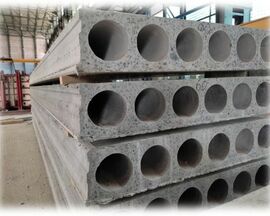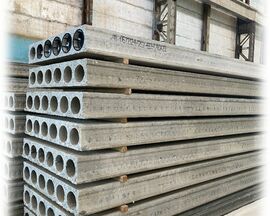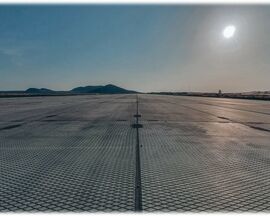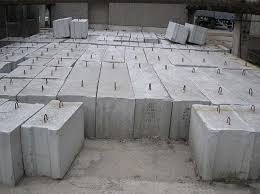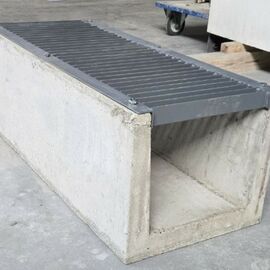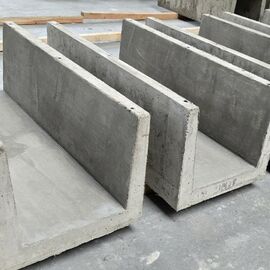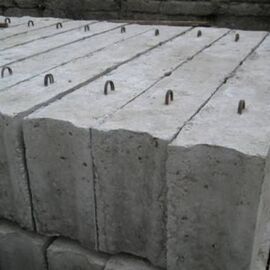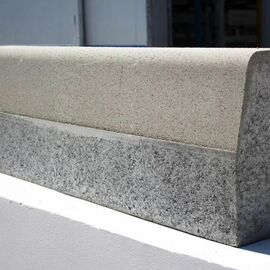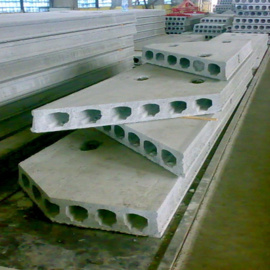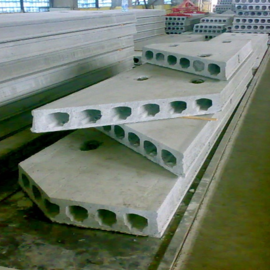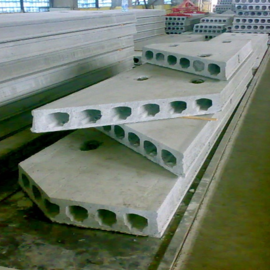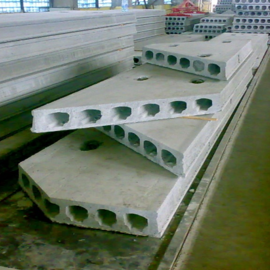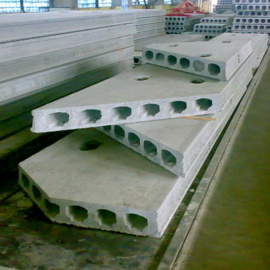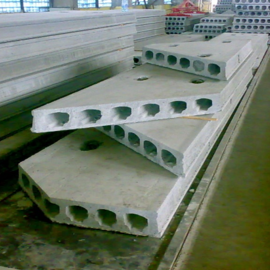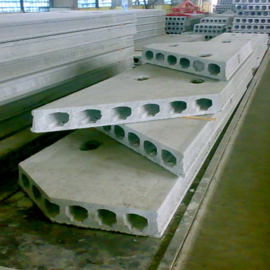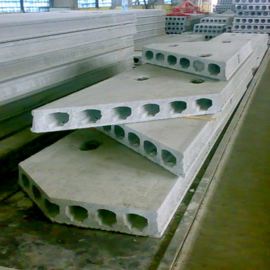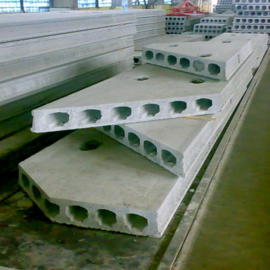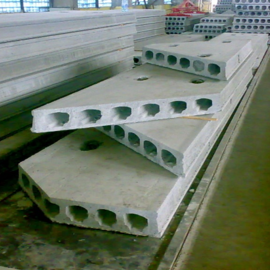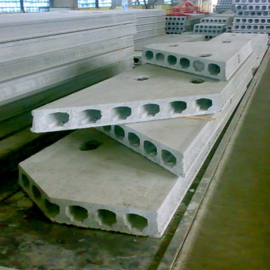Iron - Concrete Structures (ZBK)
1. Prestressed plates.
The floor slabs are manufactured in accordance with DSTU 2008, the quality is confirmed by the relevant certificates. They can be used in the construction of both residential and industrial buildings. It is possible to manufacture plates of any size with a width of up to 1200 mm and a length of 2400 mm to 11500 mm.
Prestressed slabs are extremely durable construction products that provide an exceptional service life due to their resistance to corrosion and cracking. Production in a controlled factory environment allows to reduce the amount of waste, noise and emissions during the entire construction process.
Prestressed reinforced concrete slabs are created by tensioning reinforcing rods in reinforced concrete slabs, which makes them stronger and more durable, and allows you to reduce the possibility of free deflection of the product to a minimum. Accordingly, the strength of the plate is much higher than that of the PC-plate, in the production of which ordinary fittings are used. Prestressed plates are characterized by a clear geometric shape and smooth surface. The hole diameter is 149 and 160 mm. This allows you to lay communications and increase the heat and sound insulation performance of the finished structure.
Prestressed plates - plates are produced with a bearing capacity of 800 to 1950 kg/m², but more often products with an indicator of 800 kg/m² are used.
Plates can be cut at any angle.
A wide range of sizes and the possibility of cutting prestressed plates will allow you to implement the most daring designs.
2. Road slabs.
Road slabs are used for the construction of temporary, access roads, roads, platforms, warehouses. They are used in places where trucks, special equipment, and pedestrian traffic pass through. The slabs weproduced have reinforced reinforcement, to withstand a load of 6 tons per wheel. The products comply with dstu standards, are certified, and their quality. Has been tasted
Concrete road slabs are particularly durable structures used for road construction. They are used both for paving access road in industrial sectors, to private households, and on. Highways they are used as a base or an. Standalone pavement. The strength of slab elements is due to the characteristics of the source material - reinforced concrete, capable of withstanding high loads.
The installation technology is very simple. There is no need to prepare the base, develop the soil, or carry out additional work. This ensures. Fast installation. The road can be used immediately afterwards.
Concrete pavement remains in excellent condition for at least 15-20 years, compared to 5-8years for asphalt. And with proper, maintenance this period can be extended to 40 years without major repairs.
Slab blocks are not afraid of the weight of large-sized. Vehicles vibrations that occur during the movement of cars do not spoil the dense structure of the. Slab
Environmental friendliness. Vehicles driving on a concrete pavementconsume 20% less fuel. The result is a reduction in the emission of harmful substances into the atmosphere.
Concrete slabs do not requirerepair. They are not afraid of temperature changes, rain, hail. The material has a high degree of wear resistance.
Saving natural resources. Asphalt production requires, oil while concrete is made from limestone and clay. It does not contain harmful components.
Reinforced concrete slabs can be easily dismantled, which allows them to be reused. At the same time, the cost of the road is almost halved.
Great strength, the ability to drive heavy machenery, and a long service life make it possible to build larger multi-level road interchanges from concrete slabs.
3. Concrete blocks
Fundamental block of fsb 24. 4. 6. A modern type of building material. It is characterized by a high degree of frost resistance and waterproofness. The block is used for arranging the basement walls and forming the foundation of the building. All products undergo proper control during production. There is a certificate confirmed by appropriate tests. Concrete blocks have been and remain one of the most popular materials for building foundations, load-bearing walls of cottages, low-rise buildings, garages and various outbuildings. They have high density and strength (a good choice for load-bearing structures), low water absorption. A wall of concrete blocks can be laid not only by a professional bricklayer, but also by any private developer. The range of consumers of these products is extremely wide: from private individuals to large construction companies engaged in industrial construction. Concrete blocks for manual installation, havy concrete blocks, are designed of foundations and plinths. They allow you to save money on installation, without the use of installation equipment.
Strength and durability. Concrete blocks can be used for multi-storey construction, due to their high compressive strength, there is no shrinkage after construction is completed. Buildings constructed of concrete blocks are not inferior in strength to monolithic ones.
The fire resistance of concrete blocks allows them to be used in the construction of fire-resistant walls.
Frost resistance. Concrete blocks have afrost resistance raiting f 75, for comparison, the frost resistance raitin gof silicate bricks is f 35, and the average frost resistance of ceramic bricks does not exceed 75 freeze-thaw cycles in a water-saturated state. In addition, they are resistant to sudden temperature changes.
Resistance to the aggressive influence of environmental factors. Concrete blocks are moisture resistant, their water absorption does not exceed 6%, which allows them to be used for foundations and plinths.
High sound insulation. The ability to reduce the sound transmission of wallsby up to 30 db allows the use of concrete blocks for partitions.
The high speed and ease of installation of concrete blocks ensures high construction rates.
Environmental friendliness. Blocks do not have a harmful effect on human health, so they are successfully used in the construction of residential buildings.
4. Border stone.
Concrete curbs are practical and reliable in operation. They do not have all the disadvantages that are inherent in structures made of other materials, and therefore are in high demand. Their main advantages are as follows:
Availability – concrete curbs are relatively inexpensive (curbs made of granite or other natural stone).
Durability - curbs are produced using modern technology, so they are higly durable and resistant to mechanical stress
Aesthetic appeal - despite the simplicity of the design, concrete curbs look very neat and stylish;
Versatility of use – such curbs can be used to frame not only sidewalks and pedestrian areas, but also flower beds, lawns, and even alpine slides.

